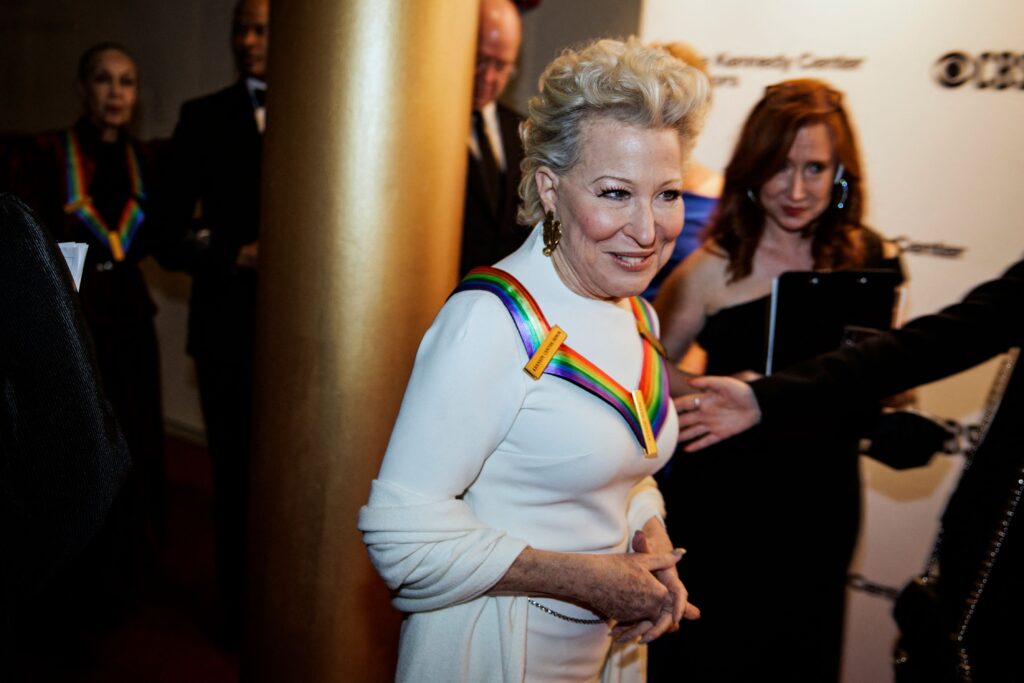Bette Midler disappoints fans after parroting anti-trans dog whistles about ‘women being erased’
Bette Midler sparked immediate alarm with her tweet. (Amanda Andrade-Rhoades/For The Washington Post via Getty Images)
Bette Midler has sparked alarm among LGBTQ+ fans after she claimed “women” are being “erased” by trans-inclusive language.
The Hocus Pocus star, 76, brought up trans rights as she fumed over the Supreme Court’s decision to overturn Roe v Wade, all but eliminating the constitutional right to an abortion after almost 50 years.
She tweeted to her 2.1 million followers: “WOMEN OF THE WORLD! We are being stripped of our rights over our bodies, our lives and even of our name!
“They don’t call us ‘women’ anymore; they call us ‘birthing people’ or ‘menstruators’, and even ‘people with vaginas’! Don’t let them erase you! Every human on earth owes you!”
WOMEN OF THE WORLD! We are being stripped of our rights over our bodies, our lives and even of our name! They don’t call us “women” anymore; they call us “birthing people” or “menstruators”, and even “people with vaginas”! Don’t let them erase you! Every human on earth owes you!
— bettemidler (@BetteMidler) July 4, 2022
Twitter users were dismayed that Bette Midler decided to parrot anti-trans dog whistles at a time when at least half of US states are poised to remove the right to an abortion.
Many urged the beloved Hocus Pocus 2 actor to use her “common sense” and reconsider her remarks.
Legendary Irish drag queen Dr Panti Bliss-Cabrera said: “No. Don’t fall for the anti-trans panic fake nonsense. No one is erasing women.
“In a few small healthcare cases where appropriate they are using trans inclusive language. That’s all.”
“The fight for women’s rights INCLUDES trans people – trans rights do not erode women’s rights,” said RuPaul’s Drag Race UK icon Crystal.
“We’re all fighting this together and this trans-exclusionary rhetoric does NOTHING to help that. Bette Midler is a woman. Some other people who give birth are not women. That’s OK!”
“Mate don’t fall for this word game nonsense,” tweeted Katy Montgomerie, an English feminist and trans woman. “Trans people just want the same rights you want.”
Or as Derry Girls actor Siobhán McSweeney simply put it: “This isn’t true. xxx.”
When it comes to healthcare, simple changes in language can make all the difference in the lives of trans men and non-binary people.

Medical experts have stressed how important gender-neutral language is to ensure that trans men and non-binary people are not excluded from vital medication information around maternity, smear tests, cancer treatments and more.
Trans men and non-binary people often fear going to the hospital for treatment. And they have their reasons: they’re often met with a healthcare system that “disempowers”, researchers say.
As staff are not always trained to support them, trans men and non-binary people fear discrimination, being misgendered or refused help altogether.
This gap in knowledge can be deeply harmful. A case study published in the New England Journal of Medicine in 2019 of described a trans man who went to an emergency room with severe abdominal pain.
Nurses assumed he was obese when in reality he was pregnant – he delivered a stillborn baby several hours later.
But an increasing number of anti-trans critics have slammed healthcare officials for encouraging staff to use phrases such as “birthing people” alongside women or co-parent when treating LGBTQ+ patients, among other inclusive terms. Often claiming that using gender-neutral terms all but “erases” women when it isn’t actually the case.
One healthcare provider in England, the Brighton and Sussex University Hospitals NHS Trust, released the country’s first-ever clinical guidelines for supporting trans people in 2021.
“If we only use gender-neutral language, we risk marginalising or erasing the experience of some of the women and people who use our services,” the guidance explains.
“We understand the fear of erasure, however marginalising other groups because they are rare will not improve care for women. We believe in human rights-based care and we can add inclusive language to our current language without subtracting anyone.”






